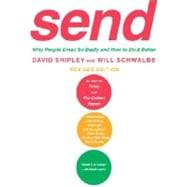
Note: Supplemental materials are not guaranteed with Rental or Used book purchases.
Purchase Benefits
What is included with this book?
| Introduction: Why Do We Email So Badly? | p. 3 |
| When Should We Email? | p. 17 |
| The Anatomy of an Email | p. 56 |
| How to Write (the Perfect) Email | p. 117 |
| The Six Essential Types of Email | p. 143 |
| The Emotional Email | p. 177 |
| The Email That Can Land You in Jail | p. 206 |
| S.E.N.D. | p. 225 |
| The Last Word | p. 228 |
| A New Last Word: How to Keep Email from Taking Over Your Life | p. 231 |
| How to Read Your Header | p. 251 |
| Acknowledgments | p. 257 |
| Notes | p. 261 |
| Index | p. 273 |
| Table of Contents provided by Ingram. All Rights Reserved. |
The New copy of this book will include any supplemental materials advertised. Please check the title of the book to determine if it should include any access cards, study guides, lab manuals, CDs, etc.
The Used, Rental and eBook copies of this book are not guaranteed to include any supplemental materials. Typically, only the book itself is included. This is true even if the title states it includes any access cards, study guides, lab manuals, CDs, etc.
Excerpted from Send: Why People Email So Badly and How to Do It Better by David Shipley, Will Schwalbe
All rights reserved by the original copyright owners. Excerpts are provided for display purposes only and may not be reproduced, reprinted or distributed without the written permission of the publisher.